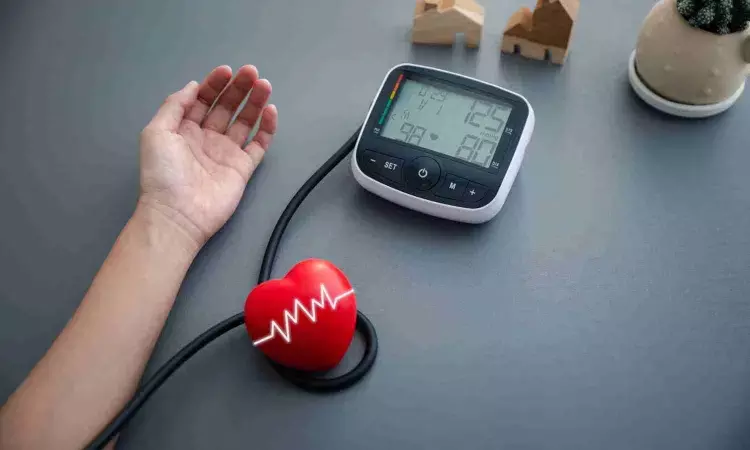- Home
- Medical news & Guidelines
- Anesthesiology
- Cardiology and CTVS
- Critical Care
- Dentistry
- Dermatology
- Diabetes and Endocrinology
- ENT
- Gastroenterology
- Medicine
- Nephrology
- Neurology
- Obstretics-Gynaecology
- Oncology
- Ophthalmology
- Orthopaedics
- Pediatrics-Neonatology
- Psychiatry
- Pulmonology
- Radiology
- Surgery
- Urology
- Laboratory Medicine
- Diet
- Nursing
- Paramedical
- Physiotherapy
- Health news
- Fact Check
- Bone Health Fact Check
- Brain Health Fact Check
- Cancer Related Fact Check
- Child Care Fact Check
- Dental and oral health fact check
- Diabetes and metabolic health fact check
- Diet and Nutrition Fact Check
- Eye and ENT Care Fact Check
- Fitness fact check
- Gut health fact check
- Heart health fact check
- Kidney health fact check
- Medical education fact check
- Men's health fact check
- Respiratory fact check
- Skin and hair care fact check
- Vaccine and Immunization fact check
- Women's health fact check
- AYUSH
- State News
- Andaman and Nicobar Islands
- Andhra Pradesh
- Arunachal Pradesh
- Assam
- Bihar
- Chandigarh
- Chattisgarh
- Dadra and Nagar Haveli
- Daman and Diu
- Delhi
- Goa
- Gujarat
- Haryana
- Himachal Pradesh
- Jammu & Kashmir
- Jharkhand
- Karnataka
- Kerala
- Ladakh
- Lakshadweep
- Madhya Pradesh
- Maharashtra
- Manipur
- Meghalaya
- Mizoram
- Nagaland
- Odisha
- Puducherry
- Punjab
- Rajasthan
- Sikkim
- Tamil Nadu
- Telangana
- Tripura
- Uttar Pradesh
- Uttrakhand
- West Bengal
- Medical Education
- Industry
Prenatal maternal stressors linked to higher BP during first year after birth, study shows

Psychosocial stress during pregnancy could lead to higher blood pressure during the first year postpartum according to research from Keck School of Medicine of USC.
The study, published in Hypertension and supported by the National Institutes of Health, investigated whether mothers who reported higher perceived stress and depressive symptoms during pregnancy, developed higher blood pressure in the four-year period after birth. The findings showed higher stress and depressive symptoms during pregnancy were associated with greater blood pressure during the first year postpartum, but associations diminished thereafter.
“Pregnancy is a complex time where women experience different physiological changes,” says Noelle Pardo, the lead author of the study and third year doctoral student in the Department of Population and Public Health Sciences at Keck School of Medicine. “This study is building on maternal health research to understand how stressors impact women’s lives and their health after pregnancy.”
The study included data from 225 mothers from the MADRES pregnancy cohort which primarily consists of Hispanic women, and low-income participants living in Los Angeles. Hispanic women have a high burden of cardiovascular risk, and there is growing evidence linking psychosocial stressors to poor cardiovascular health, which is a leading cause of death among women in the US.
In addition to prenatal psychosocial stress, Pardo explored whether prenatal neighborhood social cohesion was a protective factor for postpartum hypertension risk-a first investigation of its kind. This refers to the sense of connection and trust a pregnant woman experiences in her community. According to her findings, social structures that promoted cohesion may have had a positive influence throughout pregnancy into the postpartum period and were associated with lower blood pressure.
“We chose social cohesion as a variable to understand how connected the participants felt to their community. Right now, there aren’t many programs or policies that help foster cohesion, yet such interventions may serve as a novel protective factor,” she says.
According to Pardo, maternal health research has mostly focused on pregnancy outcomes, with limited studies investigating the mother’s health after birth. Yet, her results have shown how crucial this research is in identifying conditions rooted in pregnancy.
The real-world application of this study calls for the identification of vulnerable individuals in the pregnant population, offering interventions to reduce stress and depressive symptoms. Similarly, it emphasizes the importance of monitoring women’s health after birth, through the provision of additional hypertension screenings among mothers who experience higher prenatal stress.
“Pregnancy may be important in determining a woman’s long term cardiovascular health. Similarly, more research is needed to determine how different exposures during pregnancy can convey future cardiovascular risk to women,” she concludes.
Reference:
Noelle Pardo, Sandrah P. Eckel , Zhongzheng Niu, Rima Habre , Tingyu Yang , Xinci Chen, Prenatal Psychosocial Stressors and Blood Pressure Across 4 Years Postpartum, Hypertension, https://doi.org/10.1161/HYPERTENSIONAHA.124.23979.
Dr Kamal Kant Kohli-MBBS, DTCD- a chest specialist with more than 30 years of practice and a flair for writing clinical articles, Dr Kamal Kant Kohli joined Medical Dialogues as a Chief Editor of Medical News. Besides writing articles, as an editor, he proofreads and verifies all the medical content published on Medical Dialogues including those coming from journals, studies,medical conferences,guidelines etc. Email: drkohli@medicaldialogues.in. Contact no. 011-43720751


